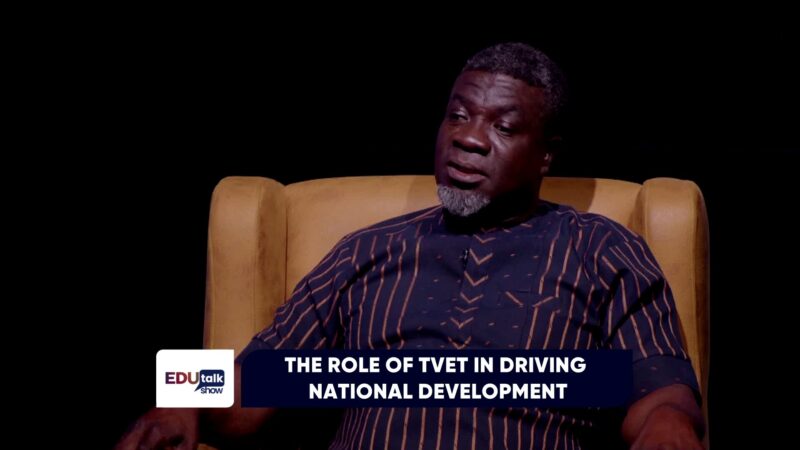The Director-General of the Ghana Technical and Vocational Education and Training (TVET) Service, Mr. David Prah, has revealed that the demand for skilled welders and fabricators in Ghana’s oil and gas industry has surged dramatically.
Speaking on JoyNews’ EduTalk Show with host Emefa Apawu, Mr. Prah explained that this growing demand has put pressure on TVET institutions to produce more graduates with specialised skills, particularly in welding for both onshore and offshore operations.

According to Mr. Prah, companies like Sentuo Oil Refinery Limited are seeking a significant number of skilled welders.
"Sentuo Oil Refinery Limited is asking the TVET Service to produce about 15,000 welders, and we are unable to meet that demand because it is so high, especially for gas welders," he said.
The oil and gas industry in Ghana has seen a boom in recent years, with numerous projects requiring the expertise of welders and fabricators. This has created a significant opportunity for TVET graduates, making welding and fabrication one of the most sought-after trades in the sector.

Mr. Prah attributed the rising demand for TVET graduates to the government’s substantial investment in upgrading technical and vocational institutions across the country. He explained that many of these institutions have undergone significant retooling and refurbishment, transforming them into modern centers of learning that are equipped to meet industry standards.
"Government has invested a substantial amount in retooling and equipping TVET institutions. Now, all the giant technical and vocational training institutions have been retooled and reequipped. Some have even been upgraded and given a facelift," Mr. Prah noted.
One of the institutions that has benefited from this transformation is the Applied Technical and Technology Institute at East Legon, which is now regarded as one of the leading auto engineering institutions in Ghana.
This investment in TVET infrastructure is part of a broader strategy by the government to make vocational education more attractive and relevant to the needs of the labor market. Mr. Prah highlighted that the Applied Technical and Technology Institute is a prime example of how these institutions are evolving to meet industry demands. "Students there are not just learning how to repair vehicles; they are learning how to assemble them, and to even ensure they function very well," he added.
Despite the improvements in infrastructure and training, Mr. Prah acknowledged that the TVET Service is currently struggling to keep up with the high demand for skilled graduates. The rapid expansion of industries like oil and gas has led to a gap between the number of graduates produced and the number of skilled workers required by employers.

"We are not able to meet the demand for welders, particularly for the gas welding sector," Mr. Prah admitted.
He emphasised that this challenge underscores the need for continued investment in TVET institutions to further expand their capacity to train more students in these specialized fields.
The oil and gas sector is not the only industry driving demand for TVET graduates. Mr. Prah pointed out that the construction sector is also experiencing high patronage, with companies requiring skilled labour for various projects. Welding and fabrication remain crucial to both sectors, making them essential skills for Ghana’s industrial growth.
The growing demand for TVET graduates is a positive development in the fight against youth unemployment in Ghana. By equipping young people with practical, industry-relevant skills, TVET institutions are playing a crucial role in providing job opportunities and contributing to the country’s economic development.
Mr. Prah credited the government’s focus on aligning TVET education with industry needs for making vocational training more attractive to the youth. He noted that the government’s Free SHS policy, which now extends to TVET institutions, has removed financial barriers that previously prevented many young people from pursuing vocational training.
"The surge in enrollment in TVET programmes is a testament to the success of this policy," Mr. Prah said, noting that enrollment in TVET institutions has increased from under 50,000 students before 2017 to nearly 200,000 students today. This dramatic increase reflects the growing recognition of TVET as a viable pathway to stable and rewarding careers, particularly in industries like oil and gas, construction, and automotive engineering.
Looking ahead, Mr. Prah is optimistic that the demand for TVET graduates will continue to grow as Ghana’s economy diversifies and industrialises. He believes that the skills being taught in TVET institutions, particularly in advanced areas like vehicle assembly and gas welding, will be critical in supporting the country’s industrial transformation.
"We are making sure that our students are globally competitive, and that they are learning advanced skills that can be applied both locally and internationally," he said.
With continued investment in infrastructure, equipment, and industry collaboration, TVET institutions are poised to play an even larger role in shaping Ghana’s future workforce.
Latest Stories
-
Dafeamekpor denies restrictions on Minority’s role in Parliament’s Appointment Committee
16 minutes -
Galamsey fight a mirage, cosmetic under Mahama’s NDC – GAP-F declares
21 minutes -
DVLA to begin excavator enforcement operation from 1st July – Acting CEO
29 minutes -
Alarming study finds greater suicide risk among screen-addicted teens
34 minutes -
Center for International Mediators and Arbitrators holds Investiture in Ghana
41 minutes -
Energy Commission denies issuing charcoal licenses for export amid booming trade in Northern Ghana
46 minutes -
DVLA to introduce chip-embedded number plates
53 minutes -
2025 BECE: Kintampo court sentences 4 for malpractices, others remanded
1 hour -
Thai PM faces calls to quit after leaked phone call
1 hour -
The Cedi appreciation and its impact on real estate
1 hour -
NSS personnel will undergo military orientation, not training – Deputy Director clarifies
1 hour -
Petition against SC judge nominee Justice Ackaah-Boafo derails vetting session
1 hour -
Bro Philemon signals big comeback to Ghana’s gospel music scene
1 hour -
Breakfast, Supper and Cholesterol levels
1 hour -
Abena Opokua Ahwenee: The voice, fire and fearless heart of Akan radio
1 hour

